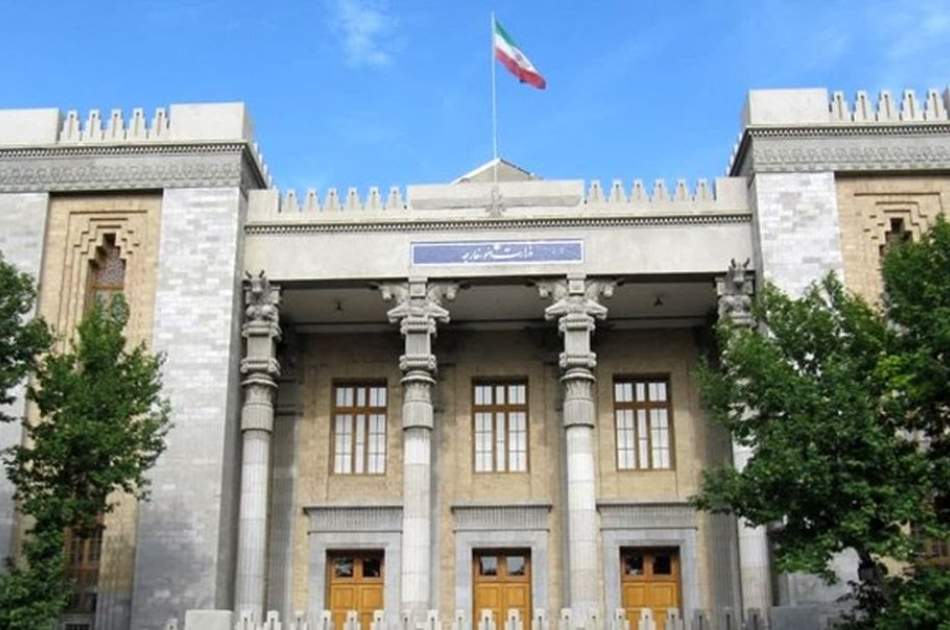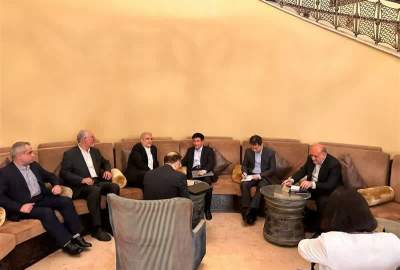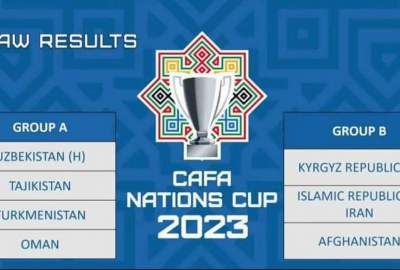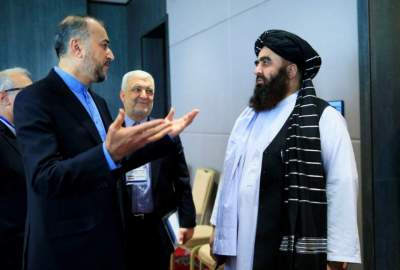In a statement, the Ministry of Foreign Affairs of Iran stated that Afghanistan is committed to providing Iran's water rights from Helmand, and has called the issuance of political statements without practical action unacceptable and announced that until Iranian experts are allowed to visit, any comments about the reduction of Helmand's water will be prohibited.
Publish dateSaturday 20 May 2023 - 08:51
Story Code : 270289
Afghan Voice Agency (AVA): President of Iran told the authorities of the Islamic Emirate that they should supply Iran's water title from the Helmand river in accordance with the water agreement of 1351 AH. On the other hand, the Islamic Emirate also issued a statement in response to Ayatollah Raisi's recent words, saying that the Islamic Emirate is committed to the treaty half a century ago regarding the sharing of Helmand water. But there is not enough water due to drought.
The Islamic Emirate also said that it will try to ensure that the promised water reaches Iran, but on the condition that the water reserves in Afghanistan reach such a level that by releasing them, the water can travel hundreds of kilometers and reach that country.
On the other hand, last night, Hossein Amir Abdullahian, the Minister of Foreign Affairs of the Islamic Republic of Iran, in response to the statement of the Islamic Emirate regarding Iran's claim to the Helmand Sea, wrote in a tweet that the criterion and the lack of water was a technical and objective visit and not the issuance of a political statement.
In this regard, the Ministry of Foreign Affairs of the Islamic Republic of Iran has stated in a statement published in this regard today, Friday, 29th of Thor: "Last day, we witnessed the issuance of a statement by the ruling body of Afghanistan. The declaration in 1402 AH, by the Afghan side about Hirmand's water rights contains contradictory and incorrect information, and the Ministry of Foreign Affairs of the Islamic Republic of Iran strongly rejects it.
This statement adds: The treaty between Iran and Afghanistan regarding the water of the Hirmand River in 1351 AH, clearly and without any ambiguity has determined the water rights of the Iranian side of the Hirmand River. This water right is a legal, objective and definite right and Afghanistan is committed to provide the said water right and based on Article 5 of the treaty, not to take any action to deprive Iran of its water right partially or completely.
In this statement, it is mentioned: In the past year and a half, the rulers of Afghanistan, although they have repeatedly emphasized on adhering to their obligations according to the treaty, but in practice, they have not implemented the obligations arising from the treaty and did not provide the necessary cooperation in releasing and securing Iran's water rights. They have not implemented and have not delivered Iran's legal water rights.
In the statement of the Ministry of Foreign Affairs of Iran, it is stated: Numerous statements for the non-delivery of the legal water rights of the Islamic Republic of Iran, including the issue of drought and water depletion in Hirmand, require expert investigations, according to the provisions of the treaty, and have not been verified by the experts of the Islamic Republic of Iran so far. Therefore, adopting such positions is illegal and unacceptable.
The Ministry of Foreign Affairs of Iran adds in this statement: Until the experts of the Islamic Republic of Iran are allowed to visit the route and upstream of Hirmand according to the Hirmand Treaty, especially Article 5 of Protocol No. 1 of that treaty, any comments regarding the reduction of Hirmand water not accepted
It is stated in the above statement: The Islamic Republic of Iran has always emphasized on technical and study cooperation through the water commissioners of the two sides and has demanded a detailed investigation of the water situation of Hirmand and provision of the water rights of the Iranian side according to the treaty.
The Ministry of Foreign Affairs of Iran has announced in this statement: the continuation of the Kamal Khan Diversion Dam and the deviation of the natural course of the Hirmand River and disturbing the conditions of the river, as well as the non-cooperation of the Afghan authorities in determining the locations of the delivery of water rights and the installation of technical systems related to the measurement of water levels. It is a clear violation of Articles 3, 5 and 6 of the Hirmand Treaty and cannot be justified by issuing political statements.
It is stated in this statement: The Islamic Republic of Iran has negotiated and discussed with Afghan authorities in good faith and in the light of the principle of good neighborliness during the past year and a half about various issues in the relations between the two countries, including the implementation of the Hirmand Treaty and the provision of water rights. . So far, negotiations and talks have been held in a friendly atmosphere and by adhering to the principle of good neighborliness, and efforts have been made to resolve all issues, including the issue of water rights, based on the conditions and interests of the parties.
The Ministry of Foreign Affairs of the Islamic Republic of Iran has emphasized in this statement that the statements and positions of the authorities of the Islamic Republic of Iran regarding the water rights of Hirmand are completely legal and based on the Hirmand Treaty and the conditions governing the river and are based on expert and technical comments and are always addressed to respect. It was based on the principle of good neighborliness and respecting the rights of neighbors.
It is stated in this statement: Non-implementation of the treaty and non-providing of Hirmand water rights by Afghanistan and issuance of political statements without practical action are not acceptable in any way and the Islamic Republic of Iran reserves its rights to take necessary measures and holds Afghanistan's full responsibility in This is emphasized.
I have to say; Afghanistan and Iran have signed a treaty to share Helmand river water in 1351.
Iranian officials say that according to this treaty, 820 million cubic meters of water should enter Iran from Afghanistan every year in wet years; But they claim that Iran does not receive this amount of water.
The Islamic Emirate also said that it will try to ensure that the promised water reaches Iran, but on the condition that the water reserves in Afghanistan reach such a level that by releasing them, the water can travel hundreds of kilometers and reach that country.
On the other hand, last night, Hossein Amir Abdullahian, the Minister of Foreign Affairs of the Islamic Republic of Iran, in response to the statement of the Islamic Emirate regarding Iran's claim to the Helmand Sea, wrote in a tweet that the criterion and the lack of water was a technical and objective visit and not the issuance of a political statement.
In this regard, the Ministry of Foreign Affairs of the Islamic Republic of Iran has stated in a statement published in this regard today, Friday, 29th of Thor: "Last day, we witnessed the issuance of a statement by the ruling body of Afghanistan. The declaration in 1402 AH, by the Afghan side about Hirmand's water rights contains contradictory and incorrect information, and the Ministry of Foreign Affairs of the Islamic Republic of Iran strongly rejects it.
This statement adds: The treaty between Iran and Afghanistan regarding the water of the Hirmand River in 1351 AH, clearly and without any ambiguity has determined the water rights of the Iranian side of the Hirmand River. This water right is a legal, objective and definite right and Afghanistan is committed to provide the said water right and based on Article 5 of the treaty, not to take any action to deprive Iran of its water right partially or completely.
In this statement, it is mentioned: In the past year and a half, the rulers of Afghanistan, although they have repeatedly emphasized on adhering to their obligations according to the treaty, but in practice, they have not implemented the obligations arising from the treaty and did not provide the necessary cooperation in releasing and securing Iran's water rights. They have not implemented and have not delivered Iran's legal water rights.
In the statement of the Ministry of Foreign Affairs of Iran, it is stated: Numerous statements for the non-delivery of the legal water rights of the Islamic Republic of Iran, including the issue of drought and water depletion in Hirmand, require expert investigations, according to the provisions of the treaty, and have not been verified by the experts of the Islamic Republic of Iran so far. Therefore, adopting such positions is illegal and unacceptable.
The Ministry of Foreign Affairs of Iran adds in this statement: Until the experts of the Islamic Republic of Iran are allowed to visit the route and upstream of Hirmand according to the Hirmand Treaty, especially Article 5 of Protocol No. 1 of that treaty, any comments regarding the reduction of Hirmand water not accepted
It is stated in the above statement: The Islamic Republic of Iran has always emphasized on technical and study cooperation through the water commissioners of the two sides and has demanded a detailed investigation of the water situation of Hirmand and provision of the water rights of the Iranian side according to the treaty.
The Ministry of Foreign Affairs of Iran has announced in this statement: the continuation of the Kamal Khan Diversion Dam and the deviation of the natural course of the Hirmand River and disturbing the conditions of the river, as well as the non-cooperation of the Afghan authorities in determining the locations of the delivery of water rights and the installation of technical systems related to the measurement of water levels. It is a clear violation of Articles 3, 5 and 6 of the Hirmand Treaty and cannot be justified by issuing political statements.
It is stated in this statement: The Islamic Republic of Iran has negotiated and discussed with Afghan authorities in good faith and in the light of the principle of good neighborliness during the past year and a half about various issues in the relations between the two countries, including the implementation of the Hirmand Treaty and the provision of water rights. . So far, negotiations and talks have been held in a friendly atmosphere and by adhering to the principle of good neighborliness, and efforts have been made to resolve all issues, including the issue of water rights, based on the conditions and interests of the parties.
The Ministry of Foreign Affairs of the Islamic Republic of Iran has emphasized in this statement that the statements and positions of the authorities of the Islamic Republic of Iran regarding the water rights of Hirmand are completely legal and based on the Hirmand Treaty and the conditions governing the river and are based on expert and technical comments and are always addressed to respect. It was based on the principle of good neighborliness and respecting the rights of neighbors.
It is stated in this statement: Non-implementation of the treaty and non-providing of Hirmand water rights by Afghanistan and issuance of political statements without practical action are not acceptable in any way and the Islamic Republic of Iran reserves its rights to take necessary measures and holds Afghanistan's full responsibility in This is emphasized.
I have to say; Afghanistan and Iran have signed a treaty to share Helmand river water in 1351.
Iranian officials say that according to this treaty, 820 million cubic meters of water should enter Iran from Afghanistan every year in wet years; But they claim that Iran does not receive this amount of water.
avapress.net/vdch6vniw23nqid.01t2.html
Tags
Top hits












